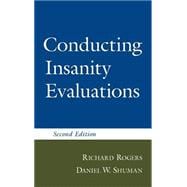Insanity evaluations represent the most challenging and complex evaluations in forensic psychology and psychiatry. Mental health and legal professionals involved in insanity cases need a solid foundation in current concepts, legal standards, and clinical methods. This need is heightened by the substantial legal and clinical changes that have occurred in the field during the past decade. This text from two leading authorities brings forensic professionals up to date on key issues surrounding insanity evaluations. It provides explicit, research-based guidelines for interview-based assessments, psychological testing and other specialized procedures, and forensic reports and testimony. The volume explores how insanity is conceptualized under the law and differentiated from other standards of criminal responsibility. A range of clinical measures and techniques are examined, with special attention to such relevant phenomena as malingering and amnesia. Included in the appendices are invaluable databases on 413 defendants evaluated for criminal responsibility and 6,479 defendants found not guilty by reason of insanity. For clinicians, the volume provides the knowledge and skills needed to conduct ethical, legally defensible insanity evaluations and to present their findings effectively. Legal professionals will gain a basis for understanding the logic and clinical methods used by mental health experts and for evaluating the quality of their assessments.








